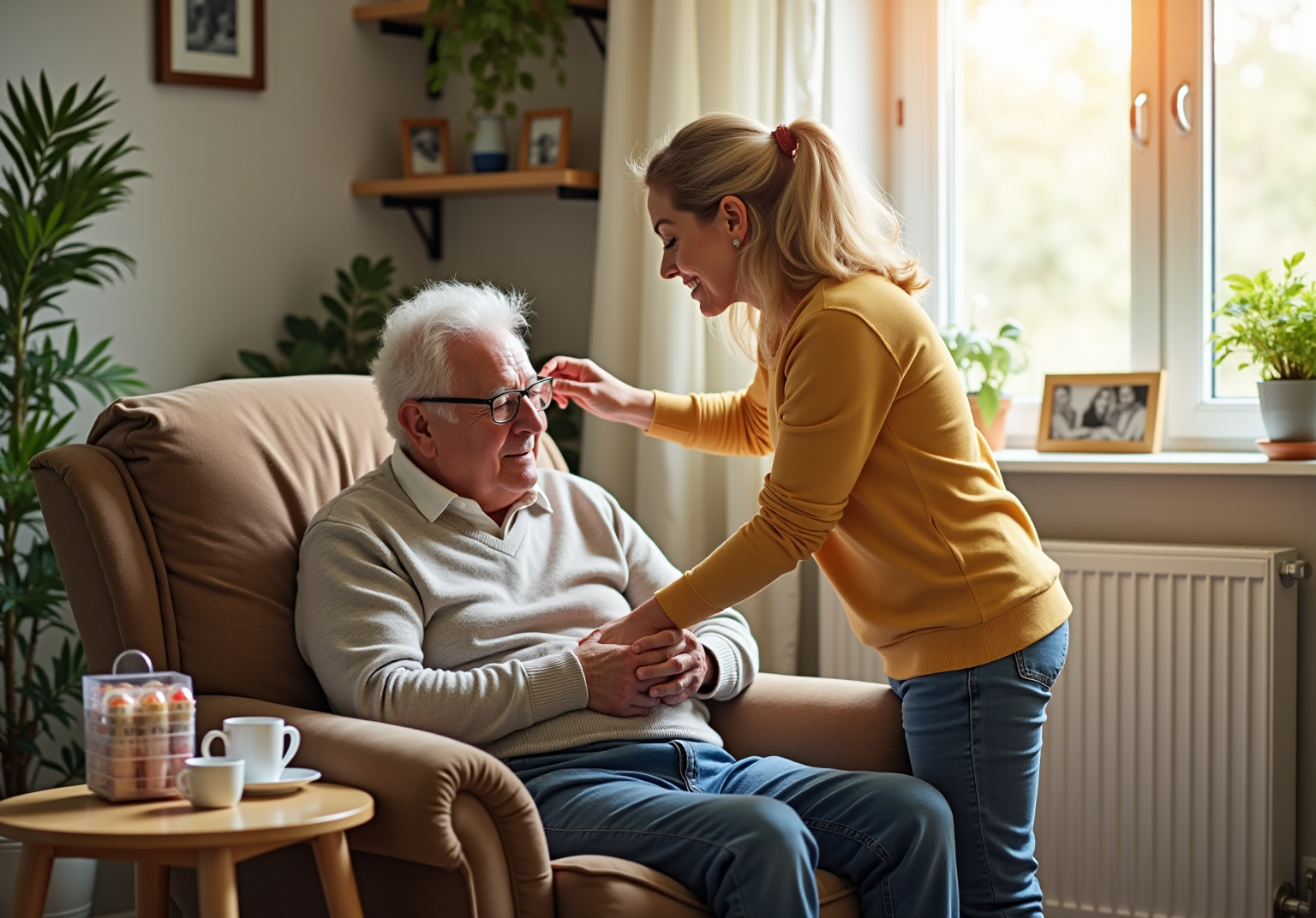Overview
Senior care at home provides a range of personalized services designed to assist elderly individuals with their daily activities. This approach allows them to maintain their independence in a familiar environment, which is so important for their well-being. Tailored support not only enhances the quality of life for seniors but also addresses the growing demand for such services as our population ages.
In addition, home care is often more effective and cost-efficient compared to institutional settings, offering a nurturing alternative that respects the preferences of seniors and their families. As you consider options for care, remember that we understand the emotional journey involved in this decision. Your comfort and peace of mind are our priorities.
We’re here for you, ready to provide the compassionate support your loved ones deserve. By choosing home care, you’re ensuring that your family member can thrive in a loving environment, surrounded by familiar faces and cherished memories. Let us help you navigate this journey with confidence and care.
Introduction
In a time when the senior population is growing rapidly, the significance of effective home care solutions has never been more vital. Senior care at home provides a personalized approach that not only enhances the quality of life for elderly individuals but also nurtures their independence within a familiar environment. This comprehensive model includes a variety of services, from personal assistance with daily tasks to medical support and companionship, all tailored to meet the unique needs of each senior. As families navigate the emotional and financial complexities of caregiving, understanding the benefits and options available in home care is essential.
This article explores the various aspects of senior care at home, offering insights into service types, personalized care planning, and practical tips for managing care effectively. We want to ensure that seniors can thrive in their own homes, surrounded by the love and comfort they deserve.
Understanding Senior Care at Home
Senior care at home encompasses a variety of services aimed at assisting elderly individuals with their daily tasks while enabling them to enjoy the comfort and familiarity of their own surroundings. This support model includes personal help with daily activities, medical assistance, and companionship, all aimed at improving the quality of life for older adults and encouraging their independence. The advantages of domestic assistance for seniors are numerous.
Home health services are less costly, more convenient, and equally effective as the assistance provided in hospitals or nursing facilities. Research indicates that residential health episodes have a relatively low hospitalization rate, with only 14.1% of patients being admitted to hospitals from 2019 to 2023. This statistic highlights the efficiency of domestic support in managing health conditions while reducing the necessity for institutionalization.
Moreover, the demographic change is notable; the population of individuals aged 65 to 84 is expected to rise by 38.8% from 2010 to 2020, emphasizing the increasing need for customized residential support services. As of 2025, this trend continues to highlight the need for efficient domestic support solutions. Families frequently choose in-home support to ease the emotional and financial pressures linked to institutional assistance.
By choosing this route, they ensure that their loved ones receive personalized attention that caters to their unique needs. Geriatric specialists stress that improving the quality of life for elderly individuals in their residences is essential, as it enables them to preserve their dignity and autonomy. Significantly, MarketsandMarkets forecasts a requirement for 924,000 personal support aides and residential health aides between 2021 and 2031, further emphasizing the necessity for domestic support services.
Current trends in senior care at home reflect a shift towards more personalized and adaptable assistance options. Best Care Nurses Registry has been a prominent family-owned health services provider in South Florida since 1980, offering flexible assistance for seniors and families. Effective at-home support frameworks emphasize harmony between providers and clients, nurturing trust and ease.
For example, certified support providers earn an average base salary of $15.65 per hour, which is essential for agencies seeking to attract and retain skilled professionals. This competitive wage system is crucial for upholding high standards of service and ensuring that caregivers feel appreciated in their positions. Best Care Nurses Registry also provides various payment methods and support with long-term assistance insurance claims, facilitating access for families to the services they require.
In summary, assistance for the elderly not only offers vital support but also greatly enhances their overall well-being. As the sector develops, the emphasis stays on providing compassionate, personalized senior care at home that allows older adults to flourish in their own residences. To learn more about our services or to schedule a consultation, call us at (888) 203-2529.
Types of Senior Care Services Available
At Best Care Nurses Registry, we offer a range of senior care at home services designed to meet the diverse needs of older adults, ensuring they receive the support necessary for maintaining their quality of life. Our services include personal care, companionship, skilled nursing, physical therapy, respite services, and residential health aide services.
Personal care services help elderly individuals with daily activities such as bathing, dressing, and grooming. This promotes dignity and independence while enhancing overall well-being. Companionship services are created to provide social engagement and emotional assistance, alleviating loneliness—a significant issue for many elderly individuals—thereby improving their mental and emotional health.
Skilled nursing services, delivered by registered nurses (RNs) or licensed practical nurses (LPNs), encompass medication management, wound treatment, and other health-related services tailored to individual needs, ensuring comprehensive support for seniors. Physical therapy focuses on helping seniors regain mobility and strength, essential for their overall well-being and independence.
- Respite Service: This service offers temporary relief for primary caregivers, allowing them to take necessary breaks while ensuring their loved ones continue to receive quality assistance.
- Residential Health Aide Services: Provide non-medical help with daily living activities, such as meal preparation and light housekeeping, ensuring a comfortable living environment and minimizing household hazards.
The demand for these services is rising as the aging population grows. By 2025, spending on long-term assistance is expected to increase significantly, particularly among individuals aged 85 and older, who represent a substantial segment of the nursing facility population. Notably, as of 1999, 52% of nursing facility residents aged 65 and over were 85 or older, underscoring the need for comprehensive care options.
Moreover, the financial implications of providing care are considerable, with lost income and benefits over a provider’s lifetime estimated at $303,880 on average.
Recent studies show that 78% of patients receiving health assistance would recommend their agency to others, indicating a high level of satisfaction with the services provided by Best Care Nurses Registry. This highlights our commitment to effectively meeting the needs of our clients, even amidst workforce challenges. Without proper senior care at home, older adults face risks such as health decline, poor nutrition, hygiene issues, mobility challenges, social isolation, household hazards, and medication management problems.
Recognizing these risks emphasizes the necessity of professional caregiving in senior care at home for an enhanced quality of life. As the landscape of senior care at home continues to evolve, understanding the various types of services offered is essential for families seeking the best support for their loved ones. We’re here for you—call Best Care Nurses Registry today at (888) 203-2529 to discuss your needs and explore how we can help ensure the safety and happiness of your loved ones.
Assessing the Needs of Seniors for Care
Evaluating the requirements of elderly individuals is a vital step in creating an effective support plan. This process typically involves several key strategies:
- Conducting a Comprehensive Assessment: Begin by evaluating the elder’s physical, emotional, and social needs. This can be achieved through structured interviews and questionnaires that capture a holistic view of their well-being. Research indicates that comprehensive geriatric assessments can significantly improve outcomes for older patients, highlighting the necessity of thorough evaluations. Collaboration among healthcare professionals is essential for developing a coordinated care plan that addresses all aspects of the elderly patient’s health.
- Identifying Daily Living Activities: It is essential to determine which activities the elderly individual can perform independently and which require assistance. Indicators suggesting the need for CNA/HHA caregiver services include difficulty with personal hygiene, dressing, cooking, cleaning, or managing medications. This assessment not only assists in planning but also empowers older adults by recognizing their capabilities, fostering a sense of independence.
- Consulting Healthcare Providers: Work together with physicians and specialists to obtain insights into any medical conditions that may affect needs. Efficient communication among healthcare providers is essential for developing a coordinated health strategy that considers all facets of the elderly individual’s well-being.
- Involving Family Members: Engaging family members in the assessment process is critical. Their familiarity with the elder’s habits and preferences can provide valuable context, ensuring that the care plan aligns with the elder’s lifestyle and wishes. Family involvement also enhances emotional support, which is essential for the elderly individual’s overall well-being. Regular check-ins with caregivers and open communication can help address any concerns promptly.
- Regularly Reviewing Needs: As circumstances evolve, it is important to reassess the individual’s needs periodically. This ongoing assessment permits modifications to the treatment plan, ensuring it stays pertinent and efficient. Statistics indicate that regular evaluations can result in better health outcomes and enhanced quality of life for older adults. Without appropriate attention, problems such as health deterioration, inadequate nutrition, and social isolation can emerge, highlighting the significance of prompt evaluations.
In 2025, the landscape of elder support continues to evolve, with a growing number of older adults utilizing technology to access information and services. Recent data shows that internet access among older adults hit 84.8% between 2021 and 2022, emphasizing the importance of incorporating digital tools into planning.
Furthermore, conversations about treatment objectives and advanced directives are crucial for empowering older patients. These discussions not only improve the quality of life but also ensure that assistance aligns with the seniors’ values and preferences. As Ken Dychtwald, founder and CEO of Age Wave, states, “We are at a unique crossroads. However, altering America’s health system to meet older adults’ expectations is feasible, realistic and could result in better health at a significantly lower cost—and can benefit the government, private sector and consumers.”
A case study on creating dementia-friendly environments demonstrates how customized settings can greatly enhance safety and autonomy for individuals with dementia, further highlighting the significance of personalized support strategies.
By following these steps and prioritizing thorough evaluations, families can develop effective support plans that truly meet the needs of their loved ones. For more information on CNA/HHA services, please contact Best Care Nurses Registry at (888) 203-2529.
Creating a Personalized Care Plan
Creating a tailored support plan for senior care at home is essential for ensuring their well-being and enhancing their quality of life. This thoughtful process involves several key steps that can make a significant difference.
- Setting Goals: Start by defining clear, achievable goals that cater to the senior’s unique needs and preferences. What matters most to them? Whether it’s health, mobility, social engagement, or daily activities, these objectives should reflect their priorities, creating a plan that truly resonates with their lifestyle.
- Identifying Resources: Take stock of the available resources, including family support, community services, and professional assistance options. Understanding what’s accessible can help in crafting a comprehensive plan that utilizes both informal and formal support systems. If you’re considering whether an elderly relative needs senior care at home, including CNA/HHA caregiver services, it’s important to assess their ability to perform daily activities and their overall health. Signs that they might need assistance include difficulties with personal hygiene, dressing, cooking, cleaning, or managing medications.
- Developing a Schedule: It’s beneficial to create a structured daily or weekly timetable that outlines when and how assistance will be provided. This schedule should be flexible enough to adapt to any changes in the senior’s condition or preferences, ensuring that support remains responsive and effective.
- Incorporating Medical Needs: Including necessary medical treatments, medications, and appointments in the support plan is crucial. This prioritization of health-related needs contributes to better outcomes. CNAs typically receive thorough training focused on medical duties, such as measuring vital signs and administering medications, while HHAs emphasize personal assistance and daily living tasks.
- Monitoring Progress: Regularly reviewing and evaluating the effectiveness of the support plan is vital. This involves checking in on the elder’s health and well-being and making adjustments as needed to address any new challenges or changes in circumstances. Maintaining open communication with the caregiver and the home support agency is essential. Regular conversations with your loved one can help address their experiences and any concerns they may have.
Statistics indicate that tailored support planning can significantly improve the quality of assistance for older adults. Seven ongoing studies are recognized that may clarify uncertainties regarding the impacts of personalized support planning. Best practices suggest including seniors in the planning process for their care at home, ensuring their preferences are respected and fostering a sense of ownership over their well-being. As Angela Coulter from the Policy Research Unit on Quality and Outcomes of Person‐centered Support states, “We also need more in‐depth information about patients’ experience of personalized planning to determine which models work best, for whom and in what circumstances.”
Successful examples of individualized support plans in senior care at home highlight the positive effects of cooperative goal-setting and consistent communication among providers, family members, and healthcare professionals. One notable case study is the Collaborative Interventions for Circulation and Depression (COINCIDE), which focuses on patients with diabetes and/or coronary heart disease coupled with depression, emphasizing clinician training in collaborative goal-setting. By focusing on the individual’s unique situation, these plans can lead to higher satisfaction rates and improved overall health management.
Additionally, it’s important to acknowledge that four studies measuring condition-specific health status found no significant difference between personalized care and usual care groups, offering a balanced view of the effectiveness of personalized care planning.
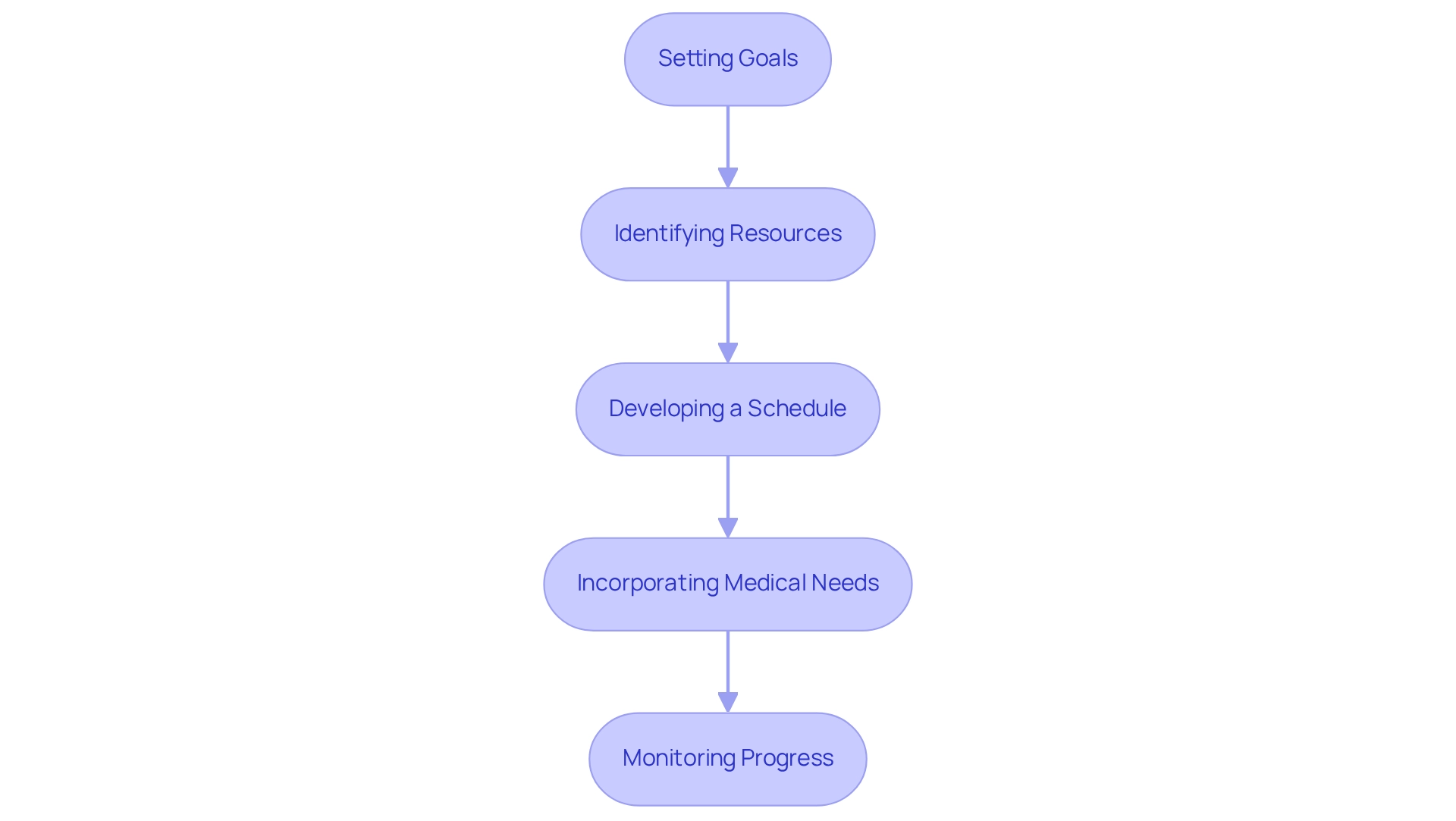
Finding and Selecting the Right Caregiver
Choosing the right support person is a vital step in ensuring senior care at home, one that requires thoughtful consideration and preparation. Let’s explore some essential steps to help you find the perfect match.
Defining Care Needs: Start by clearly outlining the specific tasks and support your loved one requires. This may include assistance with daily activities, medication management, or simply companionship. If you notice challenges with personal hygiene, dressing, cooking, cleaning, or managing medications, these are indicators that CNA or HHA caregiver services may be beneficial. Understanding these needs will not only guide your selection process but also help in identifying individuals with the right skills.
Researching Options: Take the time to investigate local agencies or independent providers known for their reliability and quality of service. Look for reviews and testimonials from other families to gauge the reputation of potential providers. It’s noteworthy that approximately 47% of caregivers earn less than $50,000 annually, according to the National Alliance for Caregiving and AARP. This highlights the importance of choosing someone who is not only qualified but also financially stable enough to provide consistent support.
Furthermore, it’s essential to acknowledge that individuals aged 50 and over lose an estimated $3 trillion in wages and benefits due to their caregiving duties, showcasing the financial impact of this role.
Conducting Interviews: Arrange discussions with prospective support providers to evaluate their qualifications, experience, and compatibility with your elder. During these conversations, inquire about their previous experiences, training, and caregiving approach. This is also an opportunity to discuss the specific needs of your loved one and assess the provider’s responsiveness and empathy.
Checking References: Always reach out to former employers or clients to confirm the reliability and quality of assistance provided. This step is crucial in ensuring that the provider has a proven track record of delivering excellent service. A case study on Alzheimer’s support has shown that tailored senior care at home significantly enhances patient outcomes, emphasizing the importance of choosing an attendant who can adapt to the individual’s specific requirements.
Understanding CNA vs. HHA: It’s important to recognize the differences between Certified Nursing Assistants (CNAs) and Home Health Aides (HHAs). CNAs typically receive more extensive training focused on medical tasks, such as taking vital signs and administering medications, while HHAs concentrate on personal care and daily living activities. Understanding this distinction can help families select the appropriate type of provider based on their loved one’s needs.
Trial Period: Consider establishing a trial phase to observe how effectively the provider and elderly individual interact. This allows both parties to adjust and provides an opportunity to assess compatibility before making a long-term commitment. Professional recommendations indicate that compatibility among support providers is crucial for effective assistance, as mismatches can lead to increased stress for both the provider and the elder.
Current legislation often does not sufficiently support informal caregivers, making it even more important to find someone who can offer the necessary assistance and empathy. By following these steps, families can make informed choices when selecting support for senior care at home, ensuring that their loved ones receive the compassionate and tailored attention they deserve.
For more information on caregiver services, consider reaching out to Best Care Nurses Registry. We’re here to help pair elderly individuals with qualified caregivers tailored to their specific needs.
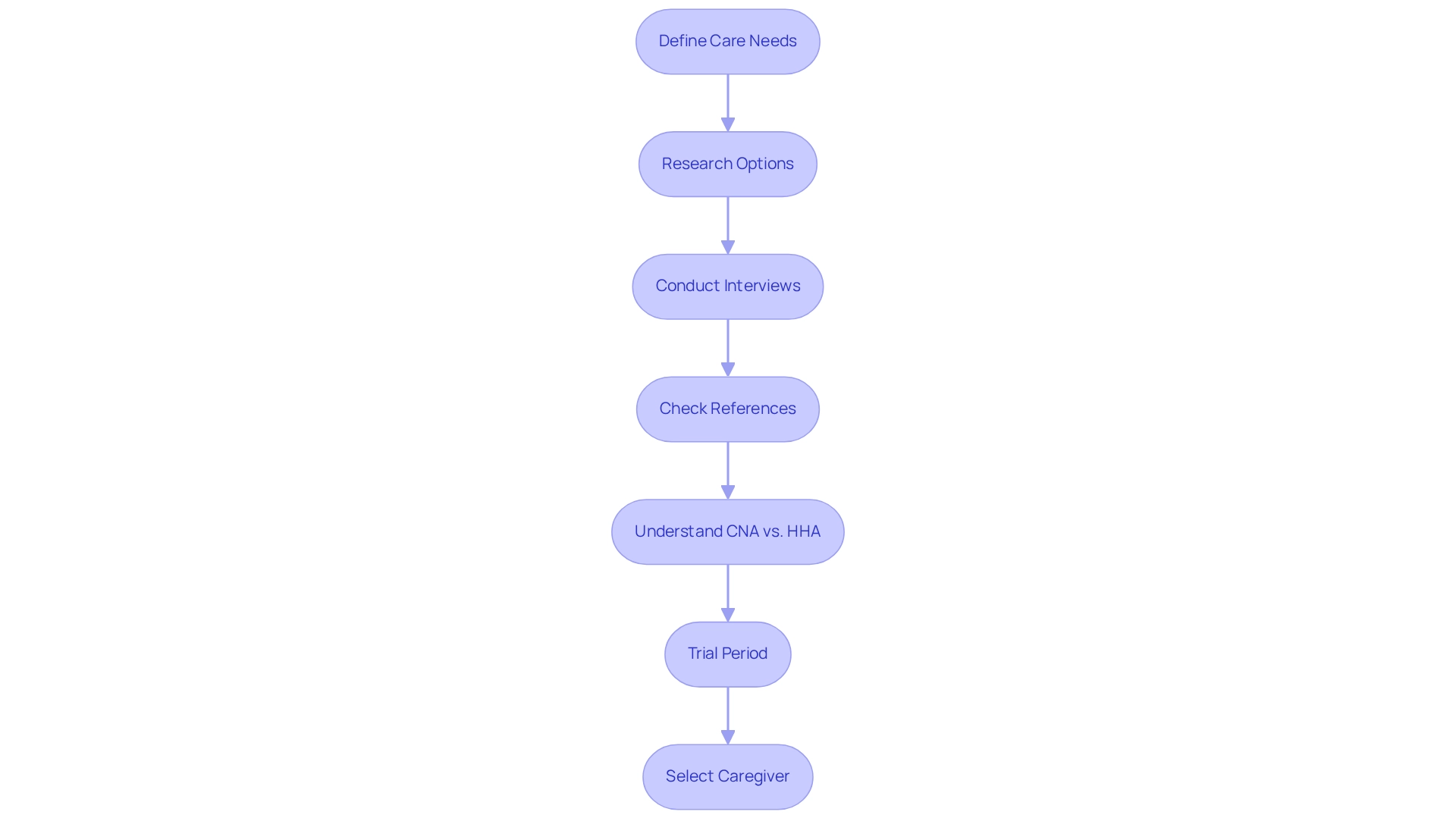
Managing Senior Care at Home: Practical Tips
Managing senior care at home requires a thoughtful approach centered on organization and communication. Here are some effective strategies to ensure a smooth caregiving experience:
- Establish a Routine: Create a daily schedule that outlines meals, medications, and activities. This structure not only helps seniors feel secure but also ensures that essential tasks are not overlooked.
- Leverage Technology: Utilize apps and digital calendars to keep track of appointments, medication schedules, and caregiver shifts. Technology can significantly enhance communication and improve coordination of services. As the home support sector evolves, agencies like Best Care Nurses Registry are embracing technological innovations to enhance service for clients, showcasing a promising future for home assistance.
- Communicate Regularly: Foster open communication among family members and caregivers. Frequent updates regarding the individual’s needs and preferences can help everyone stay coordinated and adaptable to changes in support requirements. This ongoing dialogue is vital for ensuring quality support and addressing any concerns promptly.
- Document Care: Keep a detailed log of daily activities, medications administered, and any notable changes in the elderly individual’s condition. This documentation is invaluable for healthcare providers and family members in evaluating the effectiveness of the treatment plan.
- Encourage Independence: Empower older adults by involving them in their health decisions. Supporting their engagement fosters independence and can enhance their overall well-being. As the home support industry continues to evolve, with 89% of patients expressing satisfaction with senior care at home services in 2022, these strategies are essential for effectively addressing seniors’ needs.
Additionally, hiring certified caregivers, who earn an average base pay of $15.65 per hour, ensures families receive professional support. CNAs (Certified Nursing Assistants) typically undergo comprehensive training focused on medical procedures, while HHAs (Home Health Aides) are trained to assist with personal care and daily living tasks. By implementing these practical tips and considering the services offered by Best Care Nurses Registry, such as companionship and skilled nursing, families can create a nurturing environment that prioritizes the health and happiness of their loved ones.
For personalized care solutions tailored to your loved one’s needs, we’re here for you. Reach out to Best Care Nurses Registry today.
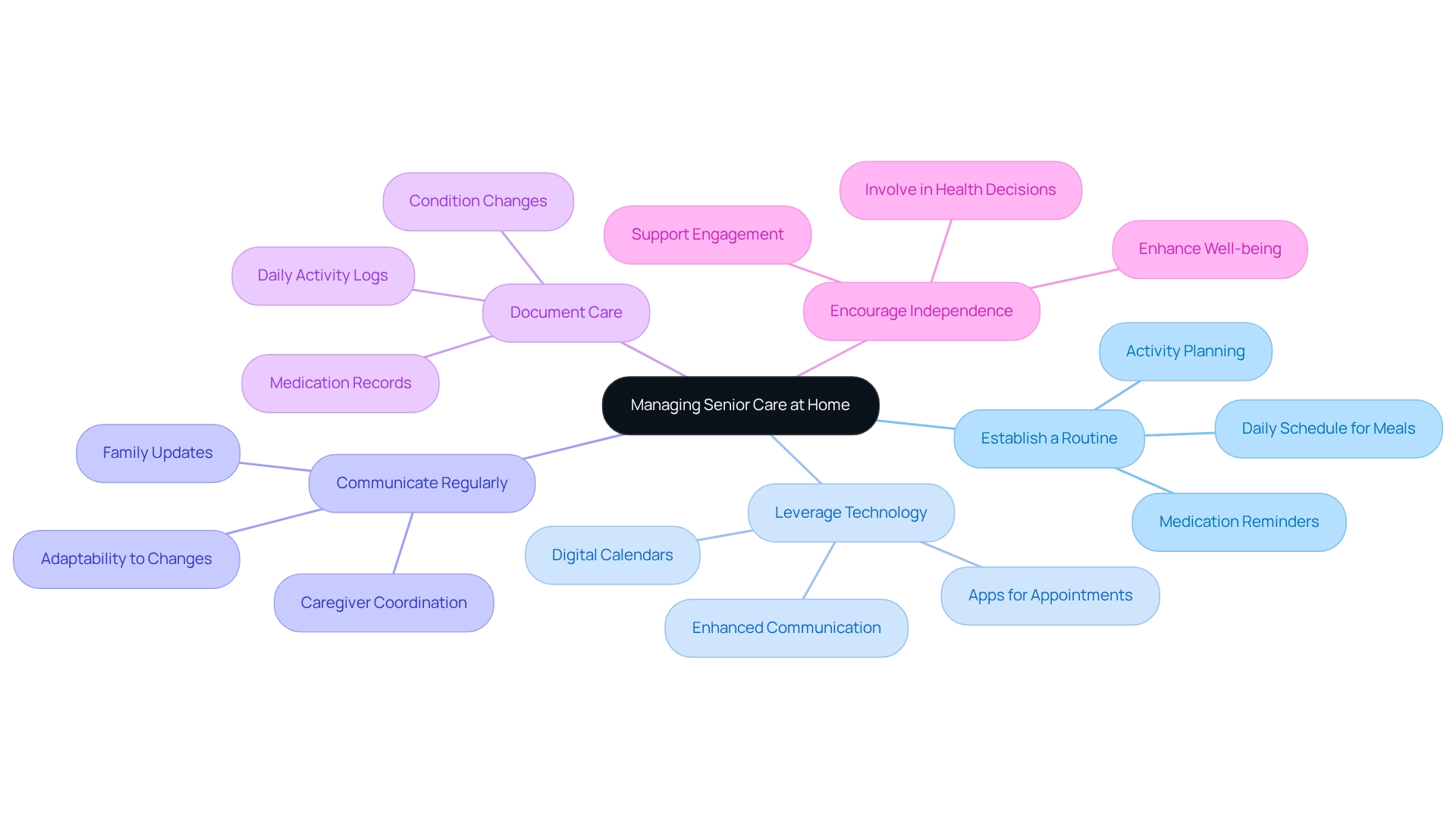
Ensuring Safety and Accessibility at Home
Ensuring safety and accessibility at home for elderly individuals is a crucial aspect of senior care, requiring thoughtful modifications that can significantly reduce the risk of accidents. It’s essential to create a safer living environment, and here are some important steps to consider:
- Remove Hazards: Begin by eliminating tripping hazards such as loose rugs, clutter, and electrical cords. A clean and organized space minimizes the risk of falls, which are a leading cause of injury among older adults. Did you know that research indicates 36% of elderly individuals in intervention studies experienced at least one fall? This highlights the critical need for preventive measures. By addressing these hazards, families can significantly lower the chances of accidents.
- Install Grab Bars: Strategically placing grab bars in bathrooms and near stairs can provide essential support. These installations help seniors maintain balance and stability, particularly in high-risk areas where slips are more likely to occur.
- Enhance Illumination: Ensure that all spaces in the residence are well-lit, particularly staircases and corridors. Adequate lighting is crucial for visibility and can help prevent accidents. Consider using smart lighting solutions, as nearly half (49%) of older adults now own at least one smart home device, including voice-controlled assistive devices and smart thermostats, which can enhance safety through automated lighting.
- Use Non-Slip Mats: Placing non-slip mats in bathrooms and kitchens can prevent falls. These mats provide additional traction and can be a simple yet effective way to enhance safety in areas prone to moisture.
- Emergency Preparedness: Developing a comprehensive emergency plan that includes easy access to emergency contacts and medical information is essential. This preparation ensures that older adults can respond quickly in case of an emergency.
Incorporating these modifications not only enhances safety but also promotes independence for seniors. Furthermore, the assistance of caregiver services from Best Care Nurses Registry can offer emotional comfort and tailored care options, ensuring that your loved ones are secure and content in their environment. Occupational therapists stress that modifications designed for personal requirements can greatly enhance accessibility and lower fall risks.
A holistic approach, which includes regular safety evaluations—100% of ER doctors concur on their significance—is essential for maintaining a secure living environment. Moreover, the case study titled ‘Comprehensive Strategies for Fall Prevention’ emphasizes the necessity for residential evaluations and occupational therapy as part of a thorough safety strategy. By prioritizing these safety measures and considering the advantages of professional caregiver support, families can create a nurturing environment for senior care at home, enabling older adults to flourish.
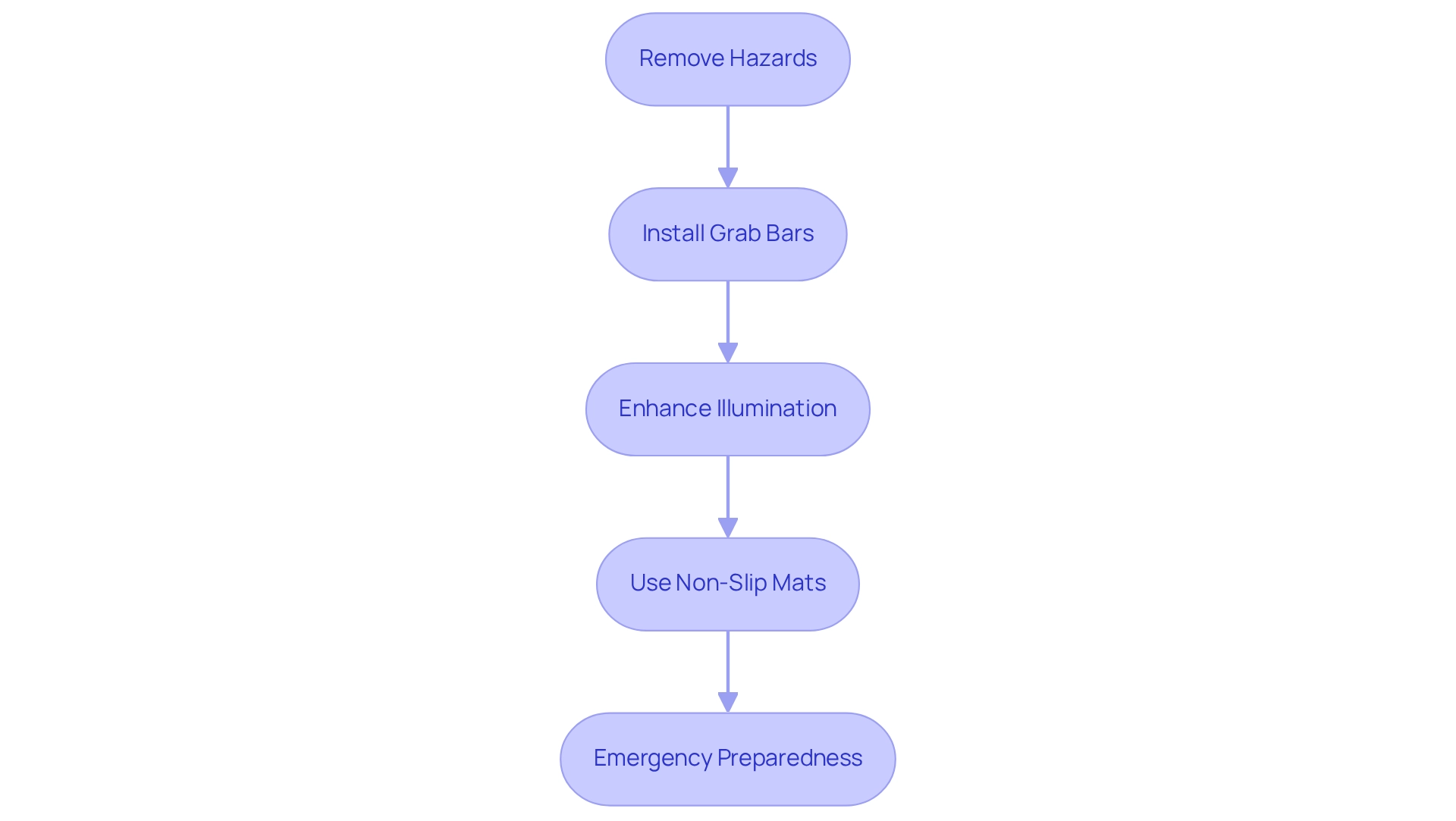
Supporting Emotional Well-being in Senior Care
Promoting emotional well-being in elderly care is vital for improving the quality of life for older adults. Effective strategies include:
- Active Listening: Dedicate time to genuinely listen to the elder’s concerns and feelings, fostering a sense of validation and understanding.
- Encouraging Social Interaction: Facilitate opportunities for older adults to engage with friends and family, as social interaction is crucial for mental health. Research indicates that seniors who maintain strong social connections experience a 25% higher improvement in cognitive function over two years compared to those who are isolated. This highlights the importance of promoting healthy aging in all its aspects, as emphasized by Carlos Augusto de Mendonca Lima, who states, “The promotion of healthy ageing in all its aspects is an important role for all societies.”
- Promoting Activities: Encourage participation in hobbies and activities that bring joy and fulfillment. Engaging in enjoyable activities not only boosts mood but also combats feelings of loneliness and depression. Companions can play a vital role in this by participating in physical activities and outdoor outings, which help maintain mobility and overall health.
- Providing Reassurance: Offer emotional support and reassurance to help alleviate feelings of anxiety or loneliness. This can be particularly important during times of transition or health challenges, as many caregivers report that 79% receive valuable information or support from healthcare professionals during such periods. Understanding that a cherished individual is receiving consistent companionship and support alleviates stress and concern for family members, enabling them to handle their own schedules more efficiently.
- Involving Professionals: If an older individual displays signs of depression or anxiety, consider involving mental health experts. Comprehensive treatment strategies, such as those highlighted in case studies on older patients with depression, emphasize the significance of appropriate referrals to psychotherapy and careful medication use to achieve optimal treatment outcomes. Additionally, it is crucial to be vigilant about cognitive health, as delirium is often under-recognized in older adults, necessitating high suspicion and screening.
- Addressing Daily Care Challenges: Companion services can assist with daily tasks such as meal preparation and personal hygiene, which are vital for preventing poor nutrition and medication mismanagement. By ensuring that older adults receive proper nutrition and take their medications on time, companions help reduce health risks associated with these challenges.
By implementing these strategies, caregivers can significantly enhance the emotional well-being of elderly individuals, ensuring they receive the compassionate and individualized support they deserve. Best Care Nurses Registry’s companion services not only improve the overall quality of life and uphold the dignity of elderly individuals but also provide essential senior care at home, allowing them to maintain their independence while reducing risks linked to isolation and safety.
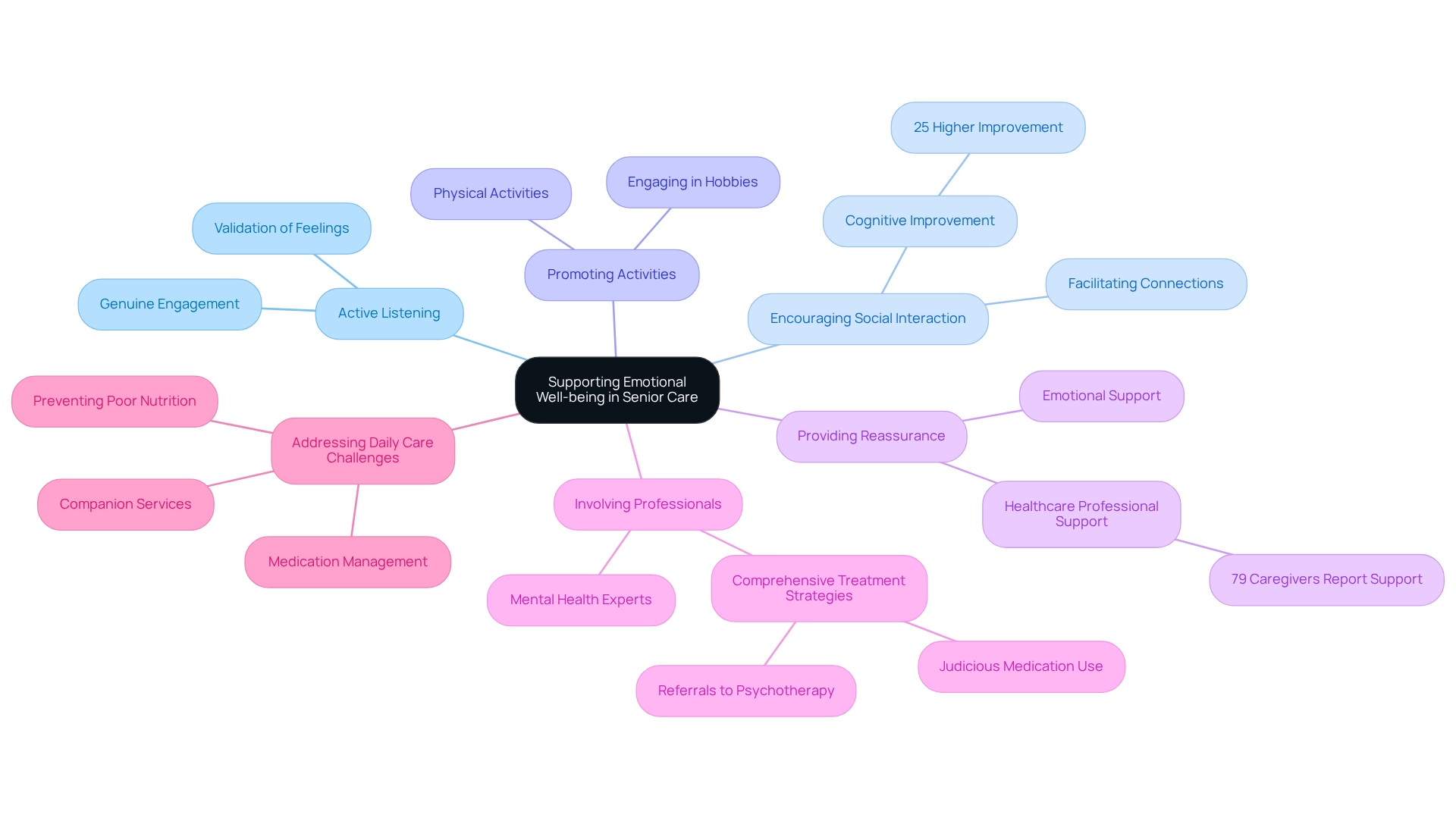
Financial Considerations for Home Senior Care
Managing the financial aspects of senior care at home can be overwhelming for families. It’s essential to understand the various factors that influence these costs to ensure your loved ones receive the best support possible. Here are some key aspects to consider:
-
Understanding Expenses: Familiarizing yourself with the average costs of residential assistance services in your area is crucial. For example, common monthly plans may range from:
- $910 for 7 hours a week
- $1,950 for 15 hours a week
- $3,900 for 30 hours a week
- $5,720 for 44 hours a week
In 2024, the costs for home health aides increased by 3%, while homemaker services saw a notable rise of 10%. As Marc Cohen, co-director for the Leading Age Long Term Services and Supports Center at the University of Massachusetts-Boston, points out, “The reason behind the striking increase in in-home assistance costs stems from shortages in the country’s home health workforce coupled with rising wages for these workers.”
-
Insurance Options: Exploring various insurance options is vital for easing financial burdens. At Best Care Nurses Registry, we accept most Long Term Care insurances directly on your behalf, allowing you to direct the carrier to pay us through an Assignment of Benefits (AOB). While Medicare may not cover activities of daily living provided by private duty caregivers, it can offer limited assistance for short durations. Understanding the specifics of these policies can help families maximize their benefits and minimize out-of-pocket expenses. Each Long Term Care Policy is unique, and we are here to help you contact your provider to review your coverage.
It’s important to note that while we accept Jobs, you will be responsible for payment if your carrier does not cover any part of the bill. Additionally, specific forms must be completed before assistance can begin, and there may be a waiting period that affects when your policy starts covering services.
-
Budgeting: Creating a comprehensive budget that accounts for all potential costs associated with home support is essential. This includes not only direct service costs but also ancillary expenses like medical supplies and transportation. Financial advisors often recommend setting aside a contingency fund to handle unexpected costs, providing peace of mind during uncertain times.
-
Financial Assistance Programs: Investigating local and state initiatives that offer financial support for seniors can provide additional relief. Many states have programs designed to assist families in managing the expenses related to senior care at home, helping to alleviate some of the financial pressures you may face.
-
Planning for the Future: Evaluating future support needs is crucial for effective financial planning. As health conditions change, the level of assistance required may increase, leading to higher costs. Proactive planning can help families prepare for these potential changes, ensuring they have the necessary resources in place.
It’s also important to recognize that the cost landscape can vary significantly by location. For instance, Maine is known as the most expensive state for residential support services, while Louisiana and Mississippi rank among the least costly. Factors such as the cost of living and state regulations play a significant role in these price differences.
By understanding these financial factors, families can make informed choices that ensure their loved ones receive the best possible senior care at home while managing expenses effectively. Remember, we’re here for you, and your comfort is our priority.
Taking Action: Steps to Start Senior Care at Home
Beginning senior care at home requires a systematic approach to ensure that the needs of your loved one are met effectively. Here are the essential steps to guide families through this process:
-
Assess Needs: Start with a thorough evaluation of the senior’s physical, emotional, and social needs. Consider their medical conditions, daily living activities, and personal preferences to create a holistic view of their requirements. Indicators suggesting the need for CNA/HHA support services include difficulty with personal hygiene, dressing, cooking, cleaning, or managing medications.
-
Research Services: Explore the different home support services offered in your vicinity. Understand the varieties of assistance provided, such as companionship, personal support, and skilled nursing, along with the credentials of caregivers. CNAs (Certified Nursing Assistants) generally undergo comprehensive training centered on medical procedures, such as measuring vital signs and administering medications, whereas HHAs (Home Health Aides) are educated mainly in personal assistance and daily living tasks. With over 1.4 million people living in nursing homes, many families are now opting for senior care at home as a more personalized option. This shift highlights the rising demand for customized support solutions, especially as the average life expectancy for women is 76.4 years and for men is 81.2 years, suggesting a growing population of elderly individuals who might need help.
-
Create a Support Plan: Formulate a customized support plan that details specific objectives, available resources, and a timetable for assistance. This plan should be adaptable to shifting needs and include input from healthcare professionals, family members, and the older adult themselves. Best Care Nurses Registry emphasizes the importance of creating a care plan that perfectly caters to individual needs, ensuring quality care.
-
Select a Provider: Choose a qualified individual who aligns with the senior’s needs and personality. It’s essential to ensure that the provider is not only skilled but also compatible with the individual to foster trust and comfort. Best Care Nurses Registry offers a personalized caregiver matching service, ensuring that clients receive compassionate assistance tailored to their specific needs. Their concierge program and adaptable service options further enhance the experience, distinguishing them from rivals.
-
Implement and Monitor: Once assistance begins, it’s vital to regularly observe the situation. Assess the elder’s well-being and the efficiency of the support plan. Open communication with the caregiver and the assistance agency is essential. Modifications might be required to tackle any emerging difficulties or changes in health condition. By implementing these measures, families can establish a nurturing atmosphere that improves the quality of life for elderly individuals. Establishing a well-organized strategy for senior care at home not only eases the pressure of caregiving but also fosters autonomy and respect for seniors. Senior care at home is less expensive, more convenient, and just as effective as the care you would receive in a hospital or nursing facility.
For personalized assistance, we’re here for you. Call Best Care Nurses Registry at (888) 203-2529 to speak with our friendly staff and discuss your needs.
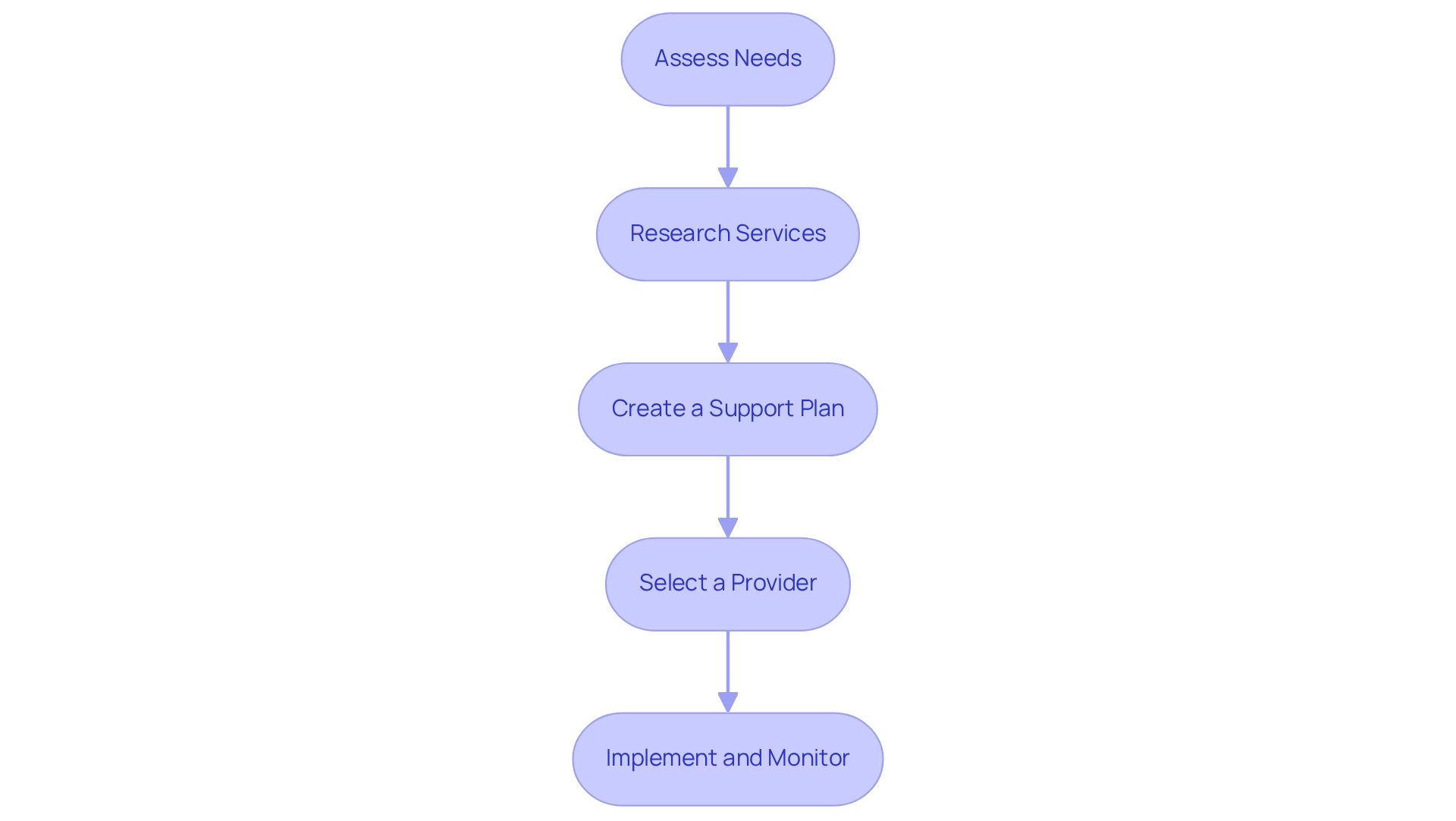
Conclusion
Effective senior care at home is not just a service; it is a vital lifeline that enhances the quality of life for elderly individuals while promoting their independence and dignity. This article has explored the multifaceted nature of home care, highlighting the array of services available, from personal assistance to skilled nursing, all tailored to meet the unique needs of each senior. The growing demand for these services reflects a significant demographic shift, emphasizing the importance of personalized care solutions that prioritize the emotional and physical well-being of seniors.
The process of assessing individual needs, creating personalized care plans, and selecting the right caregiver is crucial for ensuring that seniors receive the compassionate support they deserve. Families play a pivotal role in this journey. By actively participating in care planning and communication, they can create a nurturing environment that allows their loved ones to thrive at home. Furthermore, understanding the financial implications and available resources can help families make informed decisions, ensuring that they access the best possible care without undue burden.
As the landscape of senior care continues to evolve, embracing technology and innovative solutions will further enhance the effectiveness of home care services. By prioritizing safety, emotional well-being, and proper management practices, families can foster a supportive atmosphere that not only meets the immediate needs of seniors but also enriches their lives. The path to effective home senior care begins with understanding and action. Together, we can ensure that every senior enjoys their golden years in the comfort and familiarity of their own home.
Frequently Asked Questions
What is senior care at home?
Senior care at home encompasses various services designed to assist elderly individuals with daily tasks while allowing them to remain in the comfort of their own homes. This includes personal help, medical assistance, and companionship aimed at improving their quality of life and encouraging independence.
What are the benefits of home health services for seniors?
Home health services are generally less costly, more convenient, and equally effective compared to care provided in hospitals or nursing facilities. They help manage health conditions efficiently and reduce the need for hospitalization, with only 14.1% of patients being admitted to hospitals from 2019 to 2023.
Why is there an increasing need for senior care at home services?
The aging population is growing, with a projected 38.8% increase in individuals aged 65 to 84 from 2010 to 2020. This demographic shift highlights the need for customized residential support services to cater to the unique needs of older adults.
What types of services does Best Care Nurses Registry offer for seniors?
Best Care Nurses Registry offers a range of services including personal care, companionship, skilled nursing, physical therapy, respite services, and residential health aide services, all aimed at maintaining the quality of life for older adults.
How do personal care services benefit elderly individuals?
Personal care services assist elderly individuals with daily activities such as bathing, dressing, and grooming, promoting dignity and independence while enhancing their overall well-being.
What is the role of companionship services in senior care?
Companionship services provide social engagement and emotional support to alleviate loneliness among elderly individuals, improving their mental and emotional health.
What is involved in skilled nursing services for seniors?
Skilled nursing services, provided by registered nurses or licensed practical nurses, include medication management, wound treatment, and other health-related services tailored to the individual needs of seniors.
What is respite service and why is it important?
Respite service offers temporary relief for primary caregivers, allowing them to take necessary breaks while ensuring their loved ones continue to receive quality assistance.
What are the risks of not having proper senior care at home?
Without appropriate senior care at home, older adults may face risks such as health decline, poor nutrition, hygiene issues, mobility challenges, social isolation, household hazards, and medication management problems.
How can families evaluate the needs of elderly individuals for effective support?
Families can evaluate needs through comprehensive assessments, identifying daily living activities, consulting healthcare providers, involving family members, and regularly reviewing needs to ensure the care plan remains relevant and effective.




